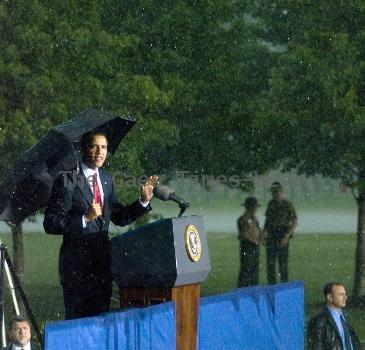Obama renews health care bill pitch to seniors
By Erica Werner, APTuesday, June 8, 2010
Obama pitching seniors on health bill
WHEATON, Md. — President Barack Obama turned his attention back to health care Tuesday with a pitch to skeptical seniors as the White House moved to boost public acceptance of the overhaul ahead of crucial midterm elections.
Obama went to the Holiday Park Multipurpose Senior Center in Wheaton, Md., for an event was being broadcast live. Senior citizens were listening by phone from gatherings around the country, prepared to ask questions of the president.
“The more people learn … the more enthusiastic they are,” Health and Human Services Secretary Kathleen Sebelius said, warming up the audience for Obama.
The timing coincides with the release later this week of the first batch of $250 checks to seniors who fall into Medicare’s prescription drug coverage gap, known as the “doughnut hole.” The checks will be the first tangible benefits most of them will be seeing from the law Obama signed in March. Some 4 million elderly and disabled people will get checks this year, and the first batch of 80,000 is supposed to go out Thursday. The checks are going to reimburse seniors for money spent on prescription drugs.
Obama also will announce new measures to combat Medicare fraud, including aiming to halve waste, fraud and abuse in the program by the end of 2012.
The health care law, which consumed much of the first year of Obama’s presidency, has taken a back seat to the disastrous Gulf oil spill in terms of Obama’s public priorities. With crucial midterm elections looming, and some of the rancorous debate around the legislation having subsided, the administration wants to draw the public’s attention to what’s in the new law for them.
The biggest elements of the law, like the new requirement for everyone to get health coverage and new marketplaces to shop for insurance, don’t kick in until 2014, but a number of benefits begin this year or next, including tax credits for small businesses, the doughnut hole rebate and free preventive care for the elderly.
Seniors are a key group for the White House. They are reliable voters who have demonstrated more skepticism about the law than other groups have, in large part because of concerns about cuts to the Medicare health program that insures people 65 and older.
An Associated Press-GfK poll conducted after the law was signed found 49 percent of seniors were strongly opposed, compared with 37 percent of those 64 and younger.
“It’s our responsibility to make sure that seniors have the information they need about their Medicare, including that the new law protects their guaranteed benefits and offers additional benefits and savings,” said Stephanie Cutter, Obama’s assistant for special projects.
“We know there’s a lot of misinformation out there, and we’re going to make sure seniors have the facts,” Cutter said.
The government’s Centers for Medicare and Medicaid Services announced a $1 million radio campaign Tuesday to help seniors avoid scams by people who might seek their personal information under the guise of offering benefits under the new law.
Republicans were quick to ridicule the outreach to seniors, noting that the majority of them won’t benefit from rebate checks because they don’t fall into the “doughnut hole.”
“Don’t be surprised if the president forgets to mention that more than nine in 10 Medicare beneficiaries will never receive one of these checks,” Republicans on the House Ways and Means Committee said in a news release.
The doughnut hole rebate checks are a down payment on the law’s approach of gradually closing the prescription drug coverage gap over the next decade. Seniors who fall into the gap are responsible for $3,610 in drug costs in 2010 before their Medicare coverage kicks in again.
Meanwhile, the administration is getting a boost from outside allies who are getting ready to roll out a high-profile advocacy group called the Health Information Center. Leaders of the group, including Andrew Grossman, who founded the advocacy group Wal-Mart Watch, are aiming to raise $25 million a year to promote the health law. Former Senate Democratic leader Tom Daschle and Victoria Kennedy, widow of the late Sen. Edward M. Kennedy, are being recruited as co-chairs.
“One of the things that is going to be critical in the course of this is making sure that the benefits of the new law become real for people,” said communications specialist Anita Dunn, a consultant to the new group who formerly was Obama’s White House communications director.
Tags: Barack Obama, Government Programs, Government-funded Health Insurance, Health Care Costs, Health Care Reform, Health Issues, Maryland, Middle East, North America, Personal Finance, Personal Insurance, Political Issues, Political Organizations, Seniors, Seniors' Health, Special Interest Groups, United States, Washington, Wheaton, Windfalls





